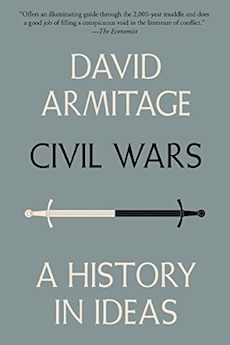By David Madden
Some readers may find David Armitage’s Civil Wars disappointing, as I did, expecting, despite the clarity of its title, a philosophy of Civil War or a comparison of Civil Wars worldwide throughout history, neither of which not book has been written. One realizes early that Armitage’s book is a lengthy, alas repetitive, study of definitions of civil war throughout history, for which I must imagine there is an eager readership nonetheless.
The main reason for the need for an international agreement as to the definition of civil war, and its differences from rebellion, insurrection, and revolution and other types of war, would be, one assumes, to arrive at a codification of laws of war for future application. All other reasons may seem to some readers comparatively overly academic, semantic, useless, or even perhaps trivial.
One might also expect a most perfect definition to shed some light on an understanding, for instance, of the American Civil War and the quagmire of the Taiping Rebellion in China that occurred during the same years. Not surprisingly then, Armitage devotes a good deal of space to the American, but neglects the Chinese Civil War.
Not until 130 pages into the book does Aritage quote a definition. In 1758, Swiss writer Emer de Vattel “stated in a groundbreaking definition” that “[w]hen a party is formed in a state, who no longer obey the sovereign, and are possessed of sufficient strength to oppose him,—or when, in a republic, the nation is divided into two opposite factions, and both sides take up arms—this is called civil war.” Armitage does not come out of this overview with a possible definition of his own.
Of the numerous definitions of Civil War historically handed down to this day, there is apparently no consensus as to which one is most apt, just as there is no consensus about which of the 128 names for the American Civil War is most apt.
Armitage’s discussion of various attempts to define Civil War throughout 349 pages includes no discussion of how a perfect definition might guide or confound the legal ramifications of the conduct of Reconstruction, which historians generally agree is more important than battles and leaders. Good examples again are the American and the Chinese Reconstructions, the duration of which was about the same for both, the effects of which continue to this day. The word “reconstruction” appears nowhere in his book.
Although some readers may wonder then from time to time what this book is in the aid of, I wish to conclude that for those interested in Armitage’s actual subject, this is probably the most authoritative and complete examination available, endowed with an excellent 46 page bibliography, and so, on that basis, I recommend it.
Founding director of the United States Civil War Center (no longer extant), David Madden (ΦBK, University of Tennessee, 1979) is author of The Tangled Web of the Civil War and Reconstruction (Rowman & Littlefield, 2015).




